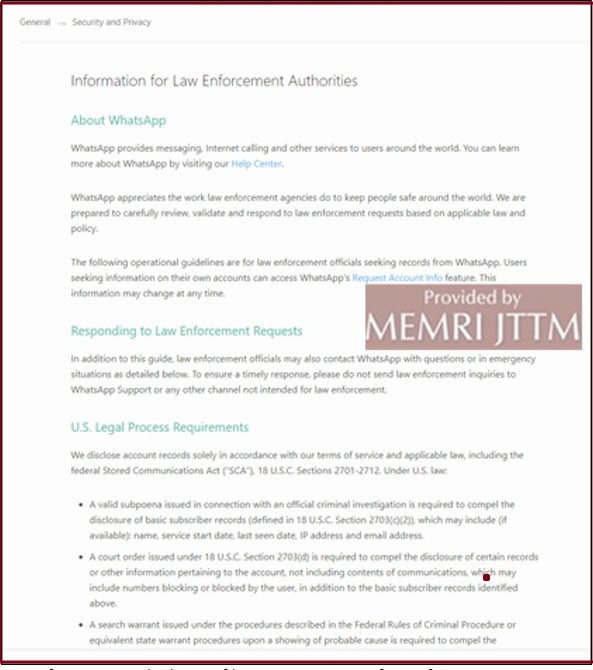I. Statements By WhatsApp
Over the past few years, and particularly following major jihadi terrorist attacks in which WhatsApp was found to have been used, WhatsApp has issued statements about its encryption and its commitment to private communications. The following are these statements:
The perpetrator of the March 2017 Westminster terror attack in London, Khalid Masood, had communicated via WhatsApp prior to the attack, but the contents of the message and the identity of the recipient could not be accessed by police because of WhatsApp's encryption.[3] WhatsApp said in a statement that the company was "horrified at the attack" and was cooperating with the investigation. It also stressed that protecting private communication is one of its "core beliefs."[4] WhatsApp is also known to have been used by June 2017 London Bridge attacker Khuram Butt three days prior to carrying out his attack.

Masood, fatally shot by police following the Westminster Bridge attack (USA Today, March 26, 2017)
SUPPORT OUR WORK

During the summer of 2017, WhatsApp published on its website "Information for Law Enforcement Authorities." It stated: "WhatsApp appreciates the work that law enforcement agencies do to keep people safe around the world. We are prepared to carefully review, validate and respond to law enforcement requests based on applicable law and policy" and added operational guidelines for law enforcement officials seeking records from WhatsApp, for example in emergencies such as a terrorist attack or threat of an attack.[5]

Faq.whatsapp.com/en/general/26000050, accessed March 20, 2020
It was reported in May 2019 that the London Bridge attackers' use of WhatsApp may have prevented authorities from identifying the plot.[6]
WhatsApp CEO Will Cathcart stressed in February 2020 that the platform's users demanded end-to-end encryption. Insisting that private communications were vital in a modern society, he vowed to defend WhatsApp's encryption against mounting threats from governments around the world: "For all of human history, people have been able to communicate privately with each other. And we don't think that should go away in a modern society." Building back doors into WhatsApp's system as governments have requested, he said, would pose an inherently unacceptable risk.
Cathcart added that WhatsApp was committed to helping law enforcement by providing metadata that could be useful in investigations, but that end-to-end encryption was necessary to keep users safe. Declining to say how his company would react if ordered to either create a back door or lose access to a major market, he added that he did not want to "get into playing out every hypothetical,” but that his company has a history of standing up for encryption.[7]
In March 2020, it was reported that the company was working on increasing security by enabling password protection for conversations even after old messages are moved from the user's phone to Google Drive.[8] In April 2020, WhatsApp announced that messages forwarded many times, which it said "can contribute to the spread of misinformation," could now only be forwarded to one chat at a time – preventing mass sharing and to "constrain virality" – down from the previous limit of five chats set in January 2019.[9]





